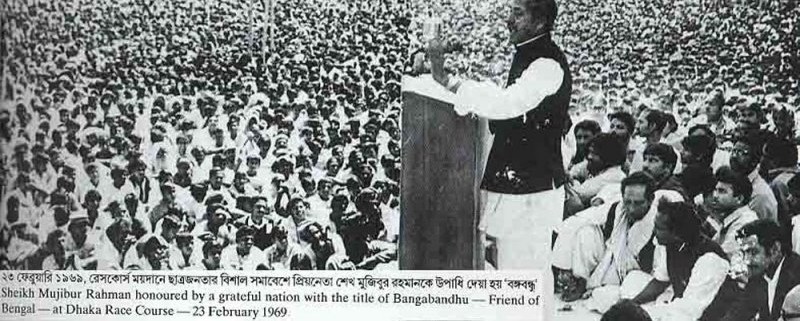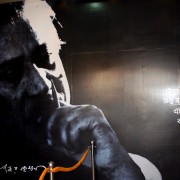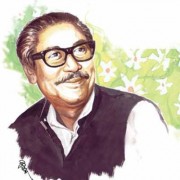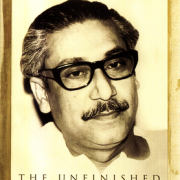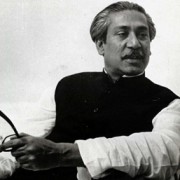August 1975 and thereafter
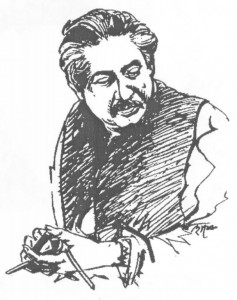 WHAT happened in August 1975 was a great tragedy perpetrated by an anti-people clique who did not want Bangladesh to move in the direction its people had desired it to take. The desire embodied a dream and an ideology; and for its fulfillment the people had struggled not only in 1971 but even before. The long struggle did not begin all of a sudden. It had a glorious history of its own. In December 1971 it reached a point where it was impossible for the old state not to yield to the emergence of an independent Bangladesh. What the assassins were bent upon doing was the bringing down not only of a great man but also, and not less importantly, of the ideology of secular Bengali nationalism together with the dream of a long-awaited and urgently needed social revolution. Sheikh Mujibur Rahman had promoted that collective desire among, and with, the people. In mourning his death we bemoan the loss of a leader as well as of an opportunity. Sheikh Mujib died a martyr, heading the long list of those who laid down their lives to liberate the people of Bangladesh.
WHAT happened in August 1975 was a great tragedy perpetrated by an anti-people clique who did not want Bangladesh to move in the direction its people had desired it to take. The desire embodied a dream and an ideology; and for its fulfillment the people had struggled not only in 1971 but even before. The long struggle did not begin all of a sudden. It had a glorious history of its own. In December 1971 it reached a point where it was impossible for the old state not to yield to the emergence of an independent Bangladesh. What the assassins were bent upon doing was the bringing down not only of a great man but also, and not less importantly, of the ideology of secular Bengali nationalism together with the dream of a long-awaited and urgently needed social revolution. Sheikh Mujibur Rahman had promoted that collective desire among, and with, the people. In mourning his death we bemoan the loss of a leader as well as of an opportunity. Sheikh Mujib died a martyr, heading the long list of those who laid down their lives to liberate the people of Bangladesh.
The assassins were a motley group comprising disgruntled army men and a section of the reactionary elements within the ruling party itself. And they acted with the silent support of the capitalist world, of which the USA was the leader. The capitalist countries had, we recall, opposed — both morally and materially — the formation of Bangladesh, being apprehensive of its turning to the left.
Not that the leftists at home were satisfied. Some of them were disheartened to see the new state not taking the line of non-capitalist development; others had gone underground fearing repression on account of their failure to join the war of liberation due to their inability to see that a resolution of the class question demanded a settlement of the national question and that the principal contradiction at that moment of history was between the people of East Bengal and the Punjabi military-bureaucratic combine that ruled Pakistan. None of the leftist groups was against a social revolution; indeed, they were fighting for it. But they did not know how to achieve that objective, which is the primary reason why they were divided among themselves, and, despite their sacrifices, were unable to take on the leadership of the liberation war. The leftists had nothing to do with the tragedy of 1975, although the Awami League leadership thought them, quite mistakenly, to be their real enemy, ignoring the reactionaries within their own camp.
The August mayhem was a rightist affair. The whole business of conspiracy, consolidation and execution was done by the ultra rightists. The more easily identifiable anti-liberation elements, including the Al-badrs and the Razakars, were not directly involved in the operation, but their ideological kinsmen had taken upon themselves a task which those known and condemned for their activities were incapable of performing.
The liberation war, let us remind ourselves, was not fought for the limited political aim of independence. We have had the experience of independence in 1947 enormously paid for in terms of miseries and tears, and found it to be no more than a transfer of power to the Punjabis to rule over the Bengalis. That is why, since 1952, we had been struggling for liberation, which, we had realized, must be based on the twin recognition that the Bengalis were a nation and that national independence would never be meaningful without an accompanying social revolution. Revolutions have come and gone, but society, which is where people live and expect to thrive, has not changed; it has remained as class-ridden and exploitative as it has since the 1793 Permanent Settlement enforced by the British. We needed and wanted a real revolution, ensuring a democratic transformation of the state and society, guaranteeing equality of rights and opportunities to every citizen. The four state principles adumbrated in the original constitution of Bangladesh indicated the goal of a social revolution, for which the first step to be taken was secularism and socialism had to be the ultimate goal.
And it is this possibility of a liberating revolution which the assassins of August wanted to destroy. Those who succeeded them in the running of the state did not find it necessary to make apologies. Briskly they want about achieving their self-appointed task of altering the whole character of the constitution, eliminating the principles of secularism and socialism. Promulgating a martial law order, General Ziaur Rahman removed secularism and put above the preamble words which read, “In the name of Allah, the Beneficent, the Merciful”, and inserted within it a pledge “in the name of almighty Allah.” Socialism was replaced by the innocuous idea of ‘economic and social justice.’ The amended constitution negated Bengali nationalism by introducing Bangladeshi nationalism in its place. Clearly, the purpose was not to widen the definition of nationalism to include the small nationalities to which recognition has been denied in the constitution, but to do away with the idea that the Bengalis are a nation. Not satisfied even with that, General Ershad went to the extent of introducing Islam as the state religion.
It is not without significance that what was called ‘a historical struggle for national liberation in the original document has been changed by Ziaur Rahman’s decree into ‘historical war for national independence,’ suggesting that we fought for political independence and not for social liberation. There is absolutely no reason to doubt that those who made the alteration were unaware of the difference between independence and liberation. They wanted to make us forget that we had fought not for another independence of the 1947 type, but for emancipation of the people through a total transformation of society. What these anti-people elements wanted was not a secular state and a democratic society but a smaller edition of what was once known as Pakistan.
Even bourgeois democracy, not to speak of the one of socialist dispensation, demands as its first requisite secularism, meaning, as it does, complete separation between state and religion; and that exactly is what has been denied to us by the rulers who commandeered the state after August 1975. What surprises us is that the Awami League, which had provided leadership in the war of liberation, has found it convenient to remain silent on the question, giving us the impression that it does not consider the restoration of secularism to be an important issue. Even in a land where corruption and crime are being committed everywhere and every day, a more grievous crime than the removal of secularism from the constitution would be difficult to find. The action has not harmed any particular person, group or institution but has struck at the very foundations of the state which had been founded on the rejection of the non-secular two-nation theory on which Pakistan had based itself.
That Pakistan was a curse and a nightmare has been made obvious to those who are now living in that broken political state. We have all sympathy for them in their suffering. We ourselves came to the knowledge about the monstrous character of that state as early as 1952, having paid much too much in terms of blood and tears for allowing ourselves to be led into voting for it in 1946 by our leaders. M. A. Jinnah, the founder of Pakistan, had himself realized the mistake he had made even before the state was set up and had discarded the two-nation theory at the first opportunity that came to him, namely, the occasion to speak before the constituent Assembly on 11 August 1947.
Looking at the happenings in Bangladesh since August 1975 from a slightly different perspective, one could say that the progress we are supposed to have made amounted really to a widening of the road for capitalism to flourish. The collective dream of liberation was for the establishment of democracy in the country, and it has to be admitted that there is not much of a difference between proper democracy and socialism. That collective dream has been shattered, to be replaced by one of personal aggrandizement. This change has been hastened by the despicably heinous act of the assassins of August 15. Today the people at large are paying for the prosperity of a few. And, very naturally, mainstream politics has become a shameless game of plunder in which the ruling class, the members of which are related to one another by social and even family ties, has engaged in cut-throat competition for the acquisition of money and power.
But mere mourning would not do. It may prove to be counterproductive, creating despair. What we have to undertake is the continuation of the struggle to achieve the realization of the collective dream of a social revolution. To give up the struggle would be to degrade ourselves further than we have already done.
Author : Serajul Islam Choudhury, Professor Serajul Islam Choudhury is a reputed academic, writer and commentator on social and political issues

